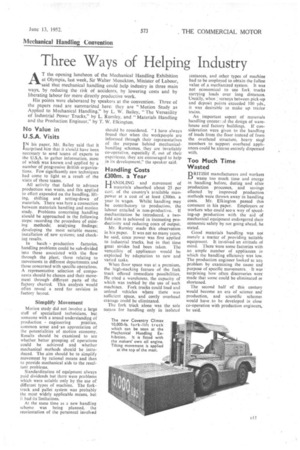Three Ways of Helping Industry
Page 49

If you've noticed an error in this article please click here to report it so we can fix it.
AT the opening luncheon of the Mechanical Handling Exhibition at Olympia, last week, Sir Walter Monckton, Minister of Labour, said that mechanical handling could help industry in three main ways, by reducing the risk of accidents, by lowering costs and by liberating labour for more directly productive work.
His points were elaborated by speakers at the convention. Three of the papers read are summarized here: they are "Motion Study as Applied to Mechanical Handling," by L. W. Bailey, "The Versatility of Industrial Power Trucks," by L. Rumley, and "Materials Handling and the Production Engineer," by T. W. Elkington.
No Value in U .S.A. Visits I N his paper, Mr. Bailey said that it surprised him that it should have been necessary to send teams of experts to the U.S.A. to gather information, most of which was known and applied by a number of progressive British organizations. Few significantly new techniques had come to light as a result of the visits of these teams.
All activity that failed to advance production was waste, and this applied to effort expended on the handling, lifting, shifting and setting-down of materials, There was here a connection between materials handling and motion study, Problems concerning handling should be approached in the following steps: recording the procedure of existing methods; analysing findings; developing the most suitable means; installation of new systems; and checking results.
In batch production factories, handling problems could be sub-divided into those associated with the flow through the plant, those relating to movements in different departments and those concerned with specific operations. A representative selection of components should be chosen and their movement through different parts of the factory charted. This analysis would often reveal a need for revision in factory layout.
Simplify Movement
Motion study did not involve a large staff of specialized technicians, but someone with a sound understanding of
production engineering practice, common sense and-an appreciation of the potentialities of motion economy. Results should be examined to see whether better grouping of operations could be achieved and whether mechanical methods should be introduced. The aim should be to simplify movement by rational means and then to provide mechanical aids to the resultant problems.
Standardization Of equipment always paid dividends but there were problems which were soluble only by the use of different types of machine. The forktruck and pallet system was probably the most widely applicable means, but it had its limitations.
At the same time as a new handling scheme was being planned, the reorientation of the personnel involved should bc considered. "I have always found that when the workpeople are informed through their representatives of the purpose behind mechanicalhandling schemes, they are invariably co-operative, especially if, out of their experience, they are encouraged to help in its development," the speaker said.
Handling Costs £300m. a Year HANDLING and movement of 1 1 materials and about 25 per cent, of the country's available manpower at a cost of at least 000m. a year in wages. Whilst handling may be contributory to production, the labour entailed is non-productive. If mechanization be introduced, a twofold aim is achieved in increasing productivity and reducing costs of output.
Mr. Rumley made this observation in his paper. It was not so many years, he said, since power was first applied to industrial trucks, but in that time great strides had been taken. The versatility of appliances would be exploited by adaptation to new and varied tasks.
When floor space was at a premium, the high-stacking feature of the fork truck offered immediate possibilities. He cited a warehouse, the capacity of which was trebled by the use of such machines. Fork trucks could load and unload vehicles where there was sufficient space, and costly overhead cranage could be eliminated.
The fork truck alone was the sole means for handling only in isolated
instances' and other types of machine had to be employed to obtain the fullest value of ,a mechanized system. It was not economical to use fork trucks carrying loads over long distances. Usually, when*; -)urneys between pick-up and deposit points exceeded 100 yds., it was desirable to make up trailer trains.
An important aspect of materials handling concer:-.A the design of warehouse and factory buildings. If consideration were given to the handling of loads from the floor instead of from the overhead structure, heavy steel members to support overhead appliances could be almost entirely dispensed with.
RIT1SH manufacturers and workers waste too much time and energy in handling before, during and after production processes, and savings effected by improved production methods were thrown away in handling
costs., Mr. Elk ington passed this comment in his paper. Employers or workers who could see■a way of speeding-up production with the aid of mechanical equipment endangered their economic safety by not going ahead. he stated.
Good materials handling was not merely a matter of .providing suitable equipment. It involved an attitude of mind. There were some factories with an ample number of appliances in which the handling efficiency was low. The production engineer looked at any problem by examining the Cause and purpose of specific movements. • It was surprising how often discoveries were made that some could be eliminated or shortened.
The second half of this century would become an era of science and production, and scientific scheme would have , to be developed in close co-operation with production engineers. he said.
Too Much Time Wasted




















































































